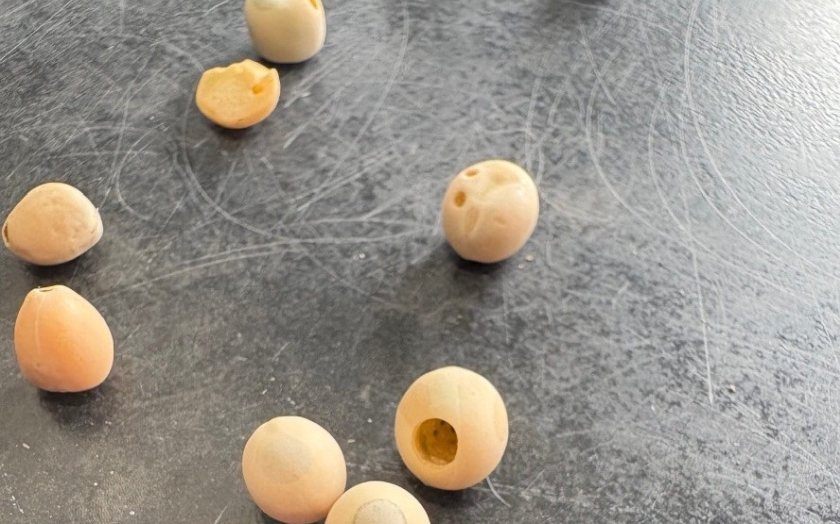
A destructive pea pest long established in Europe has been confirmed in a UK commercial crop for the first time, sparking urgent warnings for growers.
The Processors and Growers Research Organisation (PGRO) has confirmed the first occurrence of the pest in a pea crop in Cambridgeshire, raising concerns for the pulse industry.
The pest has long been established across continental Europe and is a regular problem for growers in northern France.
For years, experts have warned of the risk of pea bruchid becoming established in Britain. This spring’s unusually warm and dry conditions are believed to have enabled the insect to complete its life cycle in a UK crop for the first time.
Pea bruchid shares a similar life cycle to the bruchid species affecting faba beans: adults lay eggs on developing pea pods, with larvae maturing inside the grain. When the adult beetles emerge, they leave small circular holes in harvested peas.
The damage significantly reduces the crop’s value, particularly where peas are destined for human consumption.
PGRO chief executive, Roger Vickers warned that swift action will be required to limit the threat: “It is vital that the industry responds swiftly and collectively.
"If this pest were to become established here, the consequences for pea growers and the supply chain would be extremely costly.
“Our immediate priority is to understand the extent of the issue and to prevent pea bruchid from establishing a permanent presence in the UK.”
The organisation is setting up an incidence log to monitor the spread of the pest, with growers and traders urged to check crops and produce for signs of damage and to upload findings via the free PGRO Crop Monitor App, including images and crop location details.
High-quality photographs are essential, as bruchid damage can resemble that caused by pea moth, the body says.
It is also convening a forum with the trade to establish a coordinated action plan to prevent the insect from resuming its life cycle in spring 2026.
PGRO says that stopping egg-laying next year will be critical in preventing the pest’s permanent establishment.
Preventing spread through seed is another priority, and all pea seed imported into the UK must be free of pea bruchid. Where live insects are detected, seed lots should be fumigated, rejected or destroyed.
Any cases of live bruchids in seed for multiplication must be reported to the Animal and Plant Health Agency (APHA), which will impose movement restrictions.
While pesticides should remain a last resort under an integrated pest management (IPM) approach, PGRO is investigating possible control measures. Advisory support and wider awareness campaigns are expected to follow in the coming months.
“A healthy crop starts with good-quality, clean seed,” added Mr Vickers. “Grower understanding and active participation will be essential in ensuring we prevent pea bruchid from gaining a foothold in the UK.”
